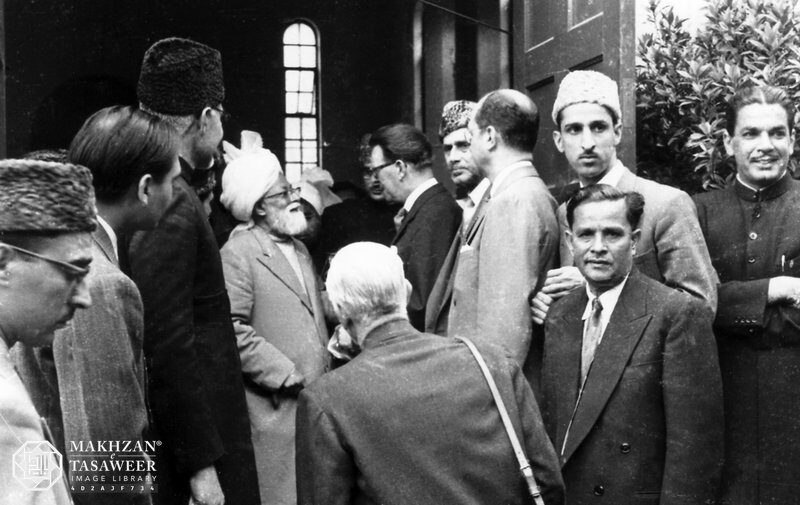Ata-ul-Haye Nasir, Ahmadiyya Archive & Research Centre
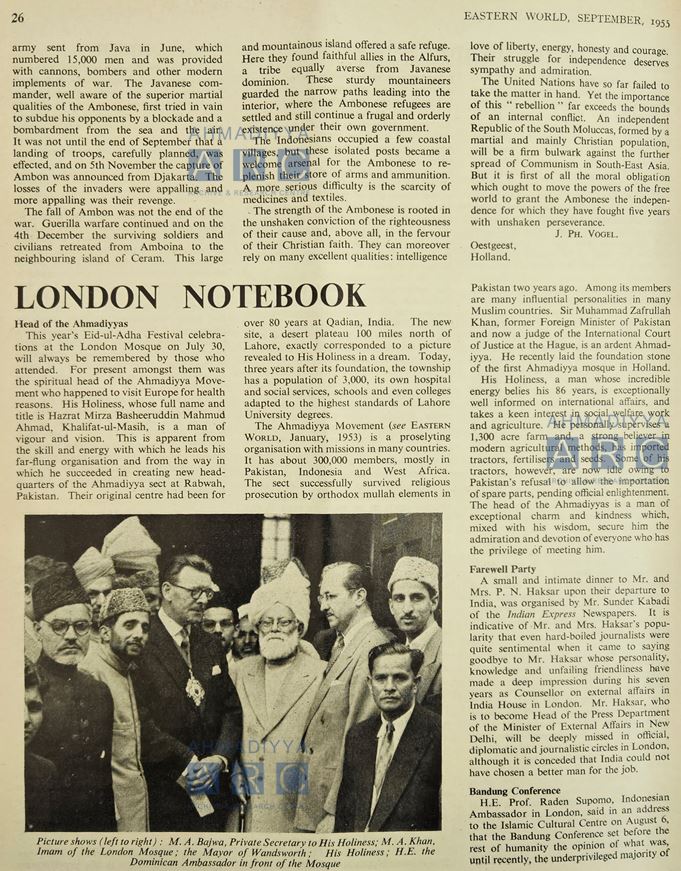
During his visit to Europe in 1955, Hazrat Musleh-e-Maud, Mirza Bashir-ud-Din Mahmud Ahmadra led the Eid-ul-Adha prayer at the Fazl Mosque in London, on 30 July 1955. This is the only Eid-ul-Adha that Hazrat Musleh-e-Maudra has led in Europe, it was the first-ever Eid-ul-Adha led in Europe by a Khalifatul Masih and it was the first-ever Eid prayer led at the Fazl Mosque by a Khalifatul Masih.
The total attendance was around 500, including various non-Muslim dignitaries, such as a Soviet attaché Mr Ivan Skripov, ambassadors of Argentina, Chile, Haiti, and the Dominican Republic; and Shaw Desmond (1877-1960) – an Irish author, spiritualist, and founder of the International Institute of Psychical Research. Moreover, Ald E Whitlock conveyed the greetings of the Wandsworth Rotary Club as well.
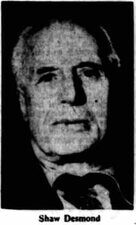
On 23 July 1955, The Civil and Military Gazette announced under the heading, “Id-ul-Azha in London”:
“At the London Mosque, Mirza Bashiruddin Mahmud Ahmad, head of the Ahmadiyya community, will lead the prayers.—Star.”

Reporting on this gathering at the Fazl Mosque, the Evening Standard of 30 July 1955 published a report under the heading “A Moslem Occasion”.

The South Western Star of London reported under the heading “Middle East in SW18”:
“Deep in the heart of the Southfields suburban scene rises the dazzling white dome of the London Mosque. […]
“Last Saturday,” scores of “fezzed and turbaned men walked through quiet suburban streets on their way to celebrate the festival of Eid-ul-Adha commemorating the offer of Abraham to sacrifice his son as commanded by God.
“Inside the Mosque, which was completely devoid of all decoration and painted a cool green, Hazrat Khalifatul Masih II[ra] who is visiting England from Pakistan, preached the sermon. A venerable white-bearded figure, he wore a white turban with his beige tunic and trousers. His talk, a simple little homily on the virtues of giving up luxury, was relayed to the garden, where a score of Muslims knelt on prayer mats with their faces turned towards Mecca.
“Then, putting on their shoes, which they had abandoned before entering the Mosque, the worshippers filed into a huge marquee for the traditional feast of lamb stew and rice. […]
“Non-Muslim visitors included a Soviet attaché, Mr Ivan Skripov, the Ambassadors of Argentina and the Dominican Republic, and Irish author Shaw Desmond. Greetings of the Wandsworth Rotary Club were conveyed by Ald E. Whitlock.” (South Western Star, 5 August 1955, p. 5)
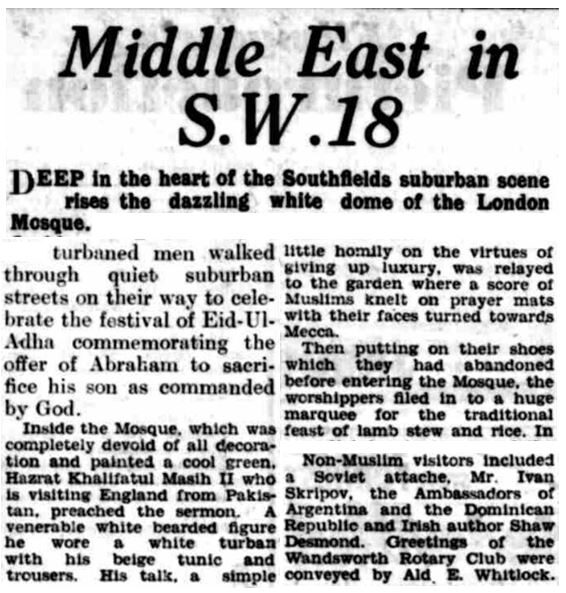
The Eastern World of September 1955 also gave a detailed report along with a photograph (seen in the beginning) of Hazrat Musleh-e-Maudra.
During his Eid Sermon, Hazrat Musleh-e-Maudra said that this Eid is called Eid-ul-Adha by the Muslims, which means the Eid of sacrifices. It is commemorated in the remembrance of Hazrat Ismailas, son of Hazrat Ibrahimas.
Huzoorra then mentioned that Allah the Almighty had commanded Hazrat Ibrahimas to sacrifice his son. The Bible says that it was Hazrat Ishaqas, however, the Holy Quran states that it was Hazrat Ismailas. Nonetheless, Huzoorra said, the Quranic view is the correct one. Huzoorra said that despite the fact that there is a debate as to which son was commanded to be sacrificed, the categorical truth is that Allah the Almighty had commanded Hazrat Ibrahimas to sacrifice his son, and he submitted to it.
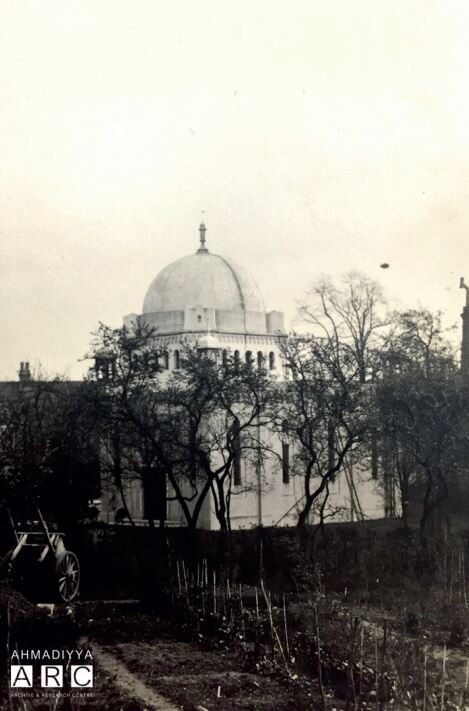
After mentioning the details of that incident, Huzoorra continued:
“Today, we have gathered here to remember that incident. Moreover, hundreds of thousands of people have convened in that uncultivable valley [Mecca] and calling out loudly:
لَبَّيْکَ اَللّٰهُمَّ لَبَّيْکَ لَا شَرِيْکَ لَکَ لَبَّيْکَ
“It meas ‘O our Lord, I submit just like Ibrahimas had said, “I submit.” There is none equal to You in Your attributes, and there is none worthy of worship except You. I have submitted to propagate Your Tawhid [Unity].’ […]
“[Hazrat Ibrahim’sas] act of leaving Ismailas there in Mecca, not only benefited Ismailas but the whole world as well. Ismailas became a great ‘teacher’ to teach Tawhid, and through him, the world succeeded in worshipping the One God. If one removes Mecca from the map of the world, there remains no other centre of Tawhid in the whole world, and if one discards the sacrifice of Ismailas, there remains no other way in the world to create a passion to dedicate lives for the sake of God. […] We can say that Ismailas dedicated his life for the sake of Tawhid, which was an act of benevolence for the world, and the place where he had made this sacrifice, became an everlasting centre of Tawhid. Hence, Ismailas is deserving of God Almighty’s blessings.
“Moreover, Mecca is also deserving of God Almighty’s blessings where [Ismailas] made these sacrifices, and the flag of God’s Unity will always remain established there. Nations will overpower other nations; the flags of various nations will fall one after another, however, the flag of Tawhid, which was raised in Mecca by Ismailas, will remain aloft till the Day of Judgement, no one can ever break or degrade it. […] This is a Divine decree that can never be altered by anyone. One after another, the [nations of the] world would come under this flag of Tawhid. At last, the world will unite there, and a time will come when – just like the slogans of God’s Unity are being raised on this day in Mecca – the slogans of Tawhid will be raised from all corners of the world and the takbir [supremacy] of the One God will be announced. […]
“In the end, I pray to Allah the Almighty that may that day come soon, may the whole world learn the lesson of this Eid, may all the people submit to God, their Creator, and may every dispute, conflict and disagreement efface from the world, may every heart become ‘Ka’bah’ – i.e., the abode of God – and may [the love of] God reside in people’s hearts.” (Khutbat-e-Mahmud, Vol. 2, pp. 386-387)
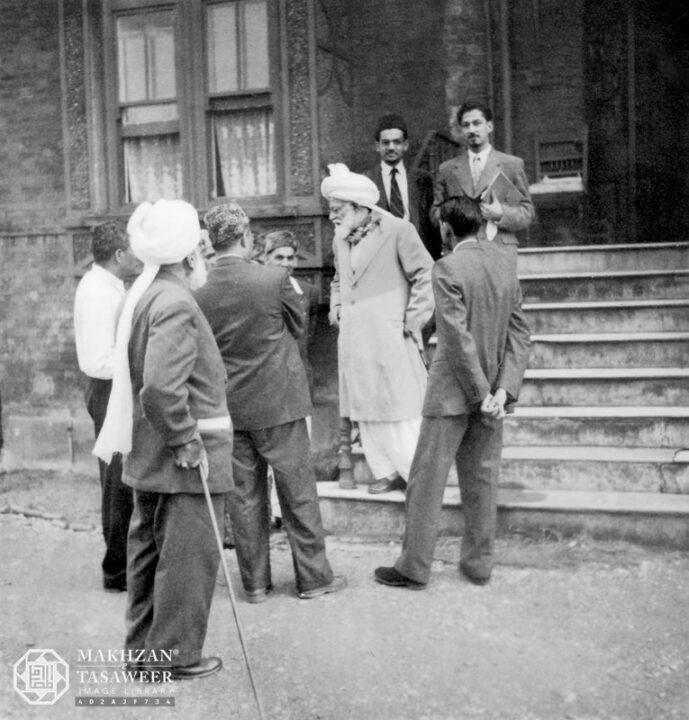
Al Fazl, in its 3 August 1955 issue, reported that during his Eid Sermon, Hazrat Musleh-e-Maudra called the attention of the Western nations to devote their lives – to establish peace in the world – for the sake of God Almighty, following in the footsteps of His chosen personages like Hazrat Ibrahimas and Hazrat Ismailas. (Al Fazl, 3 August 1955, p. 1)
After the Eid-ul-Adha prayer, the Irish author Shaw Desmond had the opportunity to meet Hazrat Musleh-e-Maudra and ask various questions as well. Huzoorra himself mentioned this meeting during his Eid-ul-Fitr Sermon on 12 May 1956. (Al Fazl, 18 April 1958, p. 4)
